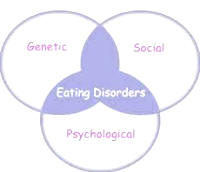Bulimia
By Bdour Berakdar


Liferature Review
There are numerous causes, “Four hundred three Japanese and 256 Australian female university students (aged 17–35 years) completed a questionnaire that gauged beliefs about the causes of BN.”. “Results: Among the Australian women, the four-component structure of perceived causes (dieting and eating practices, family dynamics, socio-cultural pressure, and psychological vulnerability) found in Dryer et al. (2012) was replicated.”.
-
The first of which is genetics. Research suggests that genetics may contribute to the emergence of eating disorders, such as bulimia. A larger risk may apply to those with a family history of eating problems.
-
Biochemical Elements Bulimia may arise because of brain neurochemical abnormalities, especially those related to serotonin. Modifications in these neurotransmitters can have an impact on impulse control, hunger, and mood.
-
Sociocultural Factors, such as social pressures and the media, the media's unrealistic representations of beauty, which promote thinness as the ideal, can fuel eating disorders and body dissatisfaction.
Furthermore, peer pressure Bulimia can arise because of social pressures and the need to fit in or adhere to body ideals among peers. Furthermore, traumatic experiences, including physical, emotional, or sexual abuse, may increase the likelihood of developing bulimia. People who have eating disorders may do so as a coping strategy or to take back control of their lives. Additionally, Family Dynamics: Eating disorders may arise because of specific familial dynamics or relationships. A problematic home life, overly judgmental parents, or a history of remarks or taunts relating to weight, for instance, may all be contributing causes.
“Why has bulimia emerged as a common symptom in many psychiatric disorders? Could the food environment be the explanation? Certainly, many changes have occurred.
- Foods high in salt, sugar and fat as well as palatability are a widespread resource.
- Eating is less embedded into social routines.
-
The desire to control body size is fashionable.
For more information click here.
If animals are exposed to similar perturbations in their
environment, they binge eat and changes in brain reward systems like
those with substances of misuse occur. Thus, food addiction could be
a cause of the obesity pandemic with implications for policy
needed.”.
Furthermore, the growth of convenience stores and fast-food
restaurants has increased accessibility to high-calorie,
low-nutrient meals, which has led to the development of unhealthy
eating patterns.
Socioeconomic factors also come into play because those with lesser incomes might not have as easy access to resources and nutrient-dense foods for good health management. Finally, severe dieting or disordered eating patterns can be caused by cultural attitudes towards body image and weight. These beliefs can place significant pressure on individuals